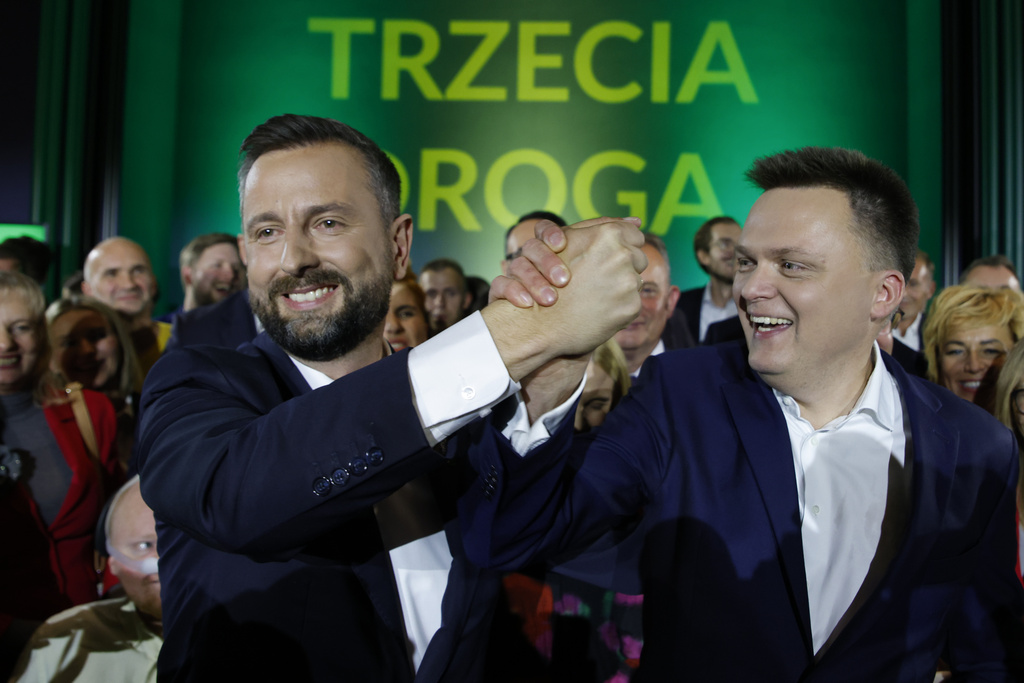In the recent tussle over public media control, Szymon Hołownia and Władysław Kosiniak-Kamysz, the leaders of the Third Way coalition, appear to be the clear losers.
While I can believe that Donald Tusk had a joyous holiday season, it is evident that the post-election period has also energized Jarosław Kaczyński. Despite what popularity polls might suggest, Hołownia and Kosiniak-Kamysz have significant reasons to worry. Their situation, to quote Marsellus Wallace from “Pulp Fiction,” is far from okay.
The initial expectations of a calm and dignified presence in the Sejm, over which Hołownia is presiding as a speaker, have given way to a reality marked by legal breaches, leaked texts about disciplinary dismissals, and private security firms raiding public television TVP stations. The arguments for suspending democratic principles to rebuild democracy might resonate with Tusk’s staunch supporters, but they are likely met with skepticism by the electorate of PSL, Polska 2050, and the Left.
No matter how many law firms are lucratively engaged to justify the suspension of legislative solutions through laws or regulations, this approach is unsustainable and deceptive, serving only as a temporary illusion for the most loyal electorate. Donald Tusk, in my view, is a part of this hardline electorate. He exudes confidence, challenging opponents and displaying a dominance that transcends obsolete codes and institutional decay. He resembles the ancient rulers he admires, who were great because they broke more treaties and laws.
The takeover of media is just the beginning. Significant changes in public media are on the horizon. However, Tusk’s allies, especially those reminiscent of the triumvirates from the late Roman Republic, a period Tusk once admired, often ended their careers in disgrace.
Since the onset of Culture Minister Bartłomiej Sienkiewicz’s brutal takeover of public media, Tusk’s coalition partners, particularly Kosiniak-Kamysz, Hołownia, and Włodzimierz Czarzasty, have been notably silent. This “head-in-the-sand” approach and the attitude of disinterest in the “dirty work” are unlikely to convince their electorates.
The electorate of the Civic Coalition, essentially the Civic Platform (PO), was promised revenge, and they are receiving it. Meanwhile, Jarosław Kaczyński, a politician who thrives in turmoil, has avoided the toughest internal party accountability thanks to Tusk’s actions. He is back in his element, leading marches, protests, and rallies, potentially dominating this space indefinitely.
The electorate of Tusk’s coalition partners, particularly those favoring the Third Way, often voted for peace. This “third way” in Poland was supposed to be about building a nation without constant political strife and tribal conflicts. However, the former opposition leaders have engaged in Tusk’s game, buying a one-way ticket into a divisive and potentially disastrous program. They now share political and possibly legal responsibility for Bartłomiej Sienkiewicz’s actions, making them more dependent on the Civic Platform leader.
Moreover, the heightened political temperature in Poland benefits Tusk, not them. Their participation in this game is a losing battle, as Tusk is undoubtedly more adept at it. By not forming a united list and trying to maintain their agency, they risk losing it entirely, potentially joining the long list of internal competitors eliminated by Tusk. They are on a path that may lead to the loss of their political identity.





